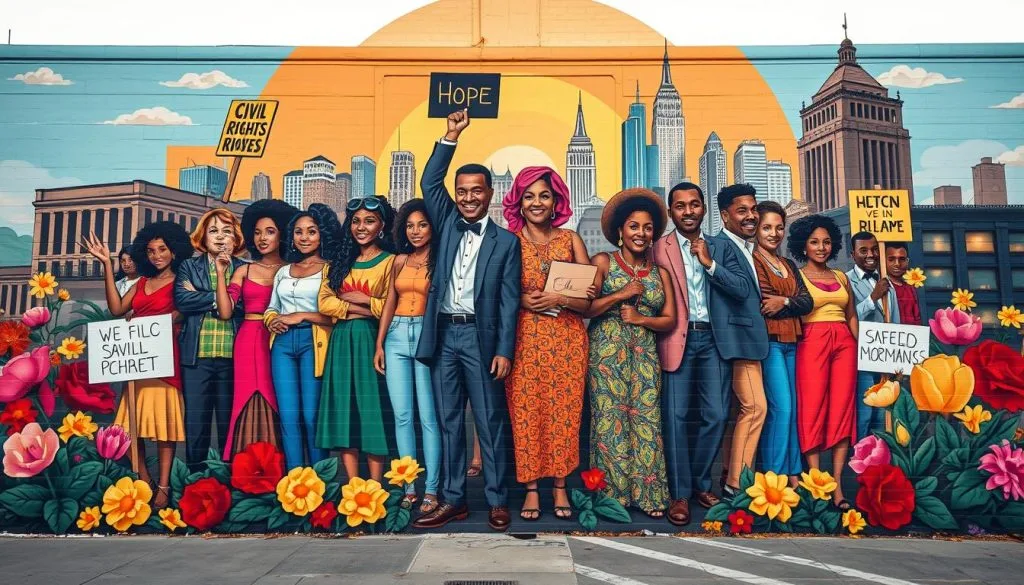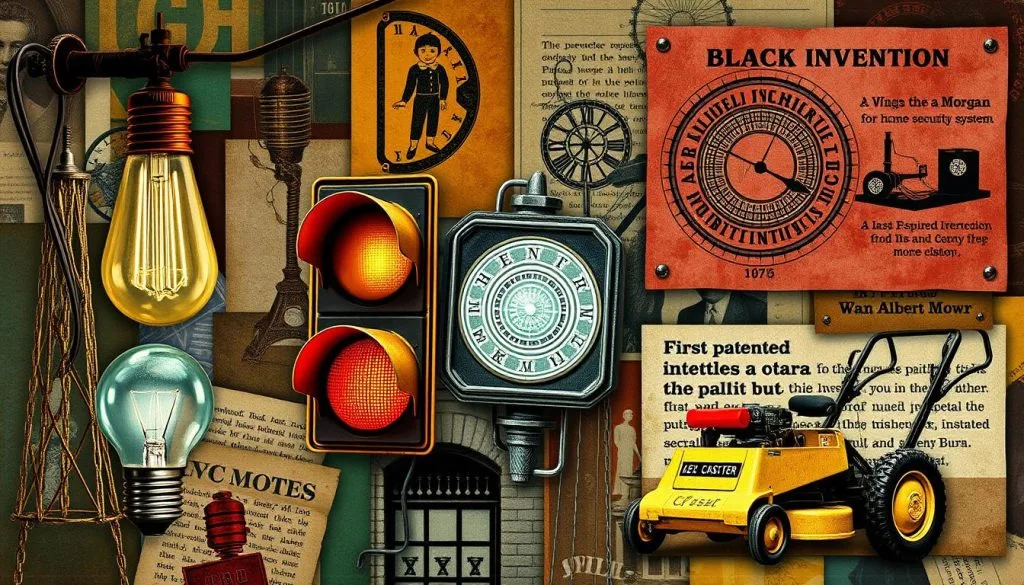Most Americans don’t know about the big role African American heritage has played in our history. This shows why we need to explore Hidden Black History. It’s about the stories of Black historical figures and their big impact on different areas. By learning these stories, we can see how Black culture still shapes America today.
Black History Month is key because it brings to light the achievements of Black historical figures. It gives them the chance to be heard and recognized. This helps us see American history in a more complete way, showing how African American heritage has shaped our country.
Key Takeaways
- Hidden Black History refers to the untold stories of Black historical figures and their contributions to American history.
- African American heritage has had a profound impact on various fields, including civil rights, business, and entertainment.
- Black History Month provides a platform for recognizing the achievements of Black historical figures and promoting a more inclusive understanding of American history.
- Exploring Hidden Black History can help to address the lack of awareness surrounding African American heritage and its significance in American history.
- By acknowledging the contributions of Black historical figures, we can work towards a more equitable and inclusive society.
- Hidden Black History is essential for understanding the ongoing influence of Black culture in America and its continued impact on contemporary society.
The Importance of Hidden Black History
Exploring Untold Black stories and Black history facts is key to understanding the past. These stories, often overlooked, are crucial for seeing how Black history shapes today. They help us see the impact and contributions of Black people through history.
It’s vital to see the value of hidden Black history. It shows us how Black history facts shape our world today. It also highlights the strength and achievements of Black people, despite many challenges.
Understanding the Narrative
To grasp the importance of hidden Black history, we must look at the past. We need to understand the social, economic, and political factors that affected Black lives. This gives us a deeper view of the challenges and triumphs of Black people.
Why These Stories Matter
Untold Black stories and Black history facts are key for diversity and inclusion. They celebrate Black achievements and inspire others. Sharing these stories helps create a fairer and more inclusive world.
To celebrate Black excellence, we can support Black businesses and learn from educational resources. We can also push for diversity and inclusion in our daily lives. These actions help build a society that values everyone, no matter their background.
Unsung Heroes of the Civil Rights Movement
The Civil Rights Movement was a key moment in American history. Many people played important roles in shaping the nation’s future. Yet, some of these heroes are often overlooked, their stories and achievements forgotten. It’s crucial to recognize and honor these Overlooked Black contributions, making sure their legacies are remembered.
Bayard Rustin, a key organizer of the 1963 March on Washington, is one such figure. His hard work behind the scenes brought attention to African Americans’ struggles. However, his name is often left out of discussions about the movement’s leaders. Women like Fannie Lou Hamer, who fought for voting rights, also have Forgotten Black narratives that need to be highlighted.

- The Montgomery Bus Boycott, led by Dr. Martin Luther King Jr.
- The Freedom Rides, which challenged segregation in the South
- The Birmingham Campaign, which highlighted the brutal treatment of African Americans in the city
These events and the people behind them show the power of collective action. They also highlight the need to preserve the history of Overlooked Black contributions and Forgotten Black narratives.
| Event | Year | Key Figures |
|---|---|---|
| Montgomery Bus Boycott | 1955-1956 | Dr. Martin Luther King Jr., Rosa Parks |
| Freedom Rides | 1961 | John Lewis, Diane Nash |
| Birmingham Campaign | 1963 | Dr. Martin Luther King Jr., Fred Shuttlesworth |
By looking into these events and the people involved, we can better understand the Civil Rights Movement. We also see the lasting effects of Overlooked Black contributions and Forgotten Black narratives on American society.
The Role of Black Women in American History
Black women have greatly influenced American history, from the civil rights movement to today. Hidden African American leaders like Sojourner Truth, Harriet Tubman, and Rosa Parks have left lasting marks. Their work is often forgotten, and we must honor their achievements.
Madam C.J. Walker and Mae Jemison are just a few examples of Black historical figures. Walker was incredibly wealthy, and Jemison was the first African American woman in space. These women, and many others, have opened doors for future generations.
Trailblazers in Various Fields
Black women have excelled in science, art, and politics. Dr. Patricia Bath invented a new cataract removal procedure. Toni Morrison, a Nobel Prize winner, wrote about the African American experience.
Overlooked Contributions and Achievements
Despite their many achievements, Black women’s contributions are often ignored. We must support and celebrate Black excellence. This can be done by backing Black-owned businesses, learning from educational resources, and pushing for diversity and inclusion.
- Supporting Black-owned businesses
- Engaging with educational resources
- Advocating for diversity, equity, and inclusion initiatives
“The future belongs to those who believe in the beauty of their dreams.” – Eleanor Roosevelt. This quote highlights the need to recognize and celebrate Black women’s achievements. They have made significant contributions to American history, despite often being overlooked.
Black Innovations and Inventions
Black culture has greatly influenced science and technology. By looking into Black history facts, we see the big impact of Black innovators and inventors. They played a key role in creating modern technology.
Things like traffic lights and refrigerators have Hidden Black History behind them. These inventions have changed our world and made our lives better. Let’s look at some of the pioneers in modern technology.
Pioneering Minds Behind Modern Technology
- Madam C.J. Walker, who developed a line of hair care products for African American hair
- Granville Woods, who invented the electric trolley system
- George Washington Carver, who developed innovative uses for peanuts and other crops

Everyday Items You Didn’t Know Had Black Inventors
From the start of Black innovation to today’s tech, Black history facts and Hidden Black History keep inspiring us. By honoring Black inventors and innovators, we celebrate a rich cultural heritage that has shaped our world.
Historical Landmarks and Their Significance
African American heritage is deeply rooted in historical landmarks. These sites have played a big role in shaping the nation’s history. They show the struggles and triumphs of Black historical figures.
Preserving these locations is key to recognizing and celebrating Black excellence. It’s important to understand their significance.
Some notable landmarks include the National Museum of African American History and Culture in Washington, D.C. Also, the Martin Luther King Jr. National Historical Park in Atlanta, Georgia, and the Little Rock Central High School in Arkansas. These sites remind us of African Americans’ significant contributions to the country’s history and development.
To appreciate these landmarks, knowing their historical context is crucial. Here are some key events and figures associated with these sites:
- The March on Washington for Jobs and Freedom, where Martin Luther King Jr. delivered his iconic “I Have a Dream” speech
- The Little Rock Nine, a group of African American students who bravely integrated Little Rock Central High School in 1957
- The Montgomery Bus Boycott, a pivotal event in the Civil Rights Movement led by Dr. King
By visiting and learning about these landmarks, we gain a deeper understanding of African American heritage. This helps us appreciate the significant role it has played in shaping the nation’s history. It also promotes a greater appreciation for Black historical figures and their contributions to society.
| Landmark | Location | Historical Significance |
|---|---|---|
| National Museum of African American History and Culture | Washington, D.C. | Explores the history, culture, and contributions of African Americans |
| Martin Luther King Jr. National Historical Park | Atlanta, Georgia | Commemorates the life and legacy of Dr. Martin Luther King Jr. |
| Little Rock Central High School | Little Rock, Arkansas | Sites of the historic integration of African American students in 1957 |
Literature and Art: Voices of the Past
Black culture has deeply influenced literature and art. Exploring Untold Black stories helps us understand Black culture’s big impact on today’s society. Black history facts are often missed, but they’re key to seeing the rich heritage of African American artists and writers.
Black Authors and Their Impact on Literature
Many famous Black authors have changed literature. For example:
- Langston Hughes, known for his poetry and plays
- Zora Neale Hurston, author of “Their Eyes Were Watching God”
- Toni Morrison, Nobel Prize-winning author of “Beloved”
These authors, among others, have shaped literature and given voice to the Black community.
Celebrating African American Artists
African American artists have also greatly influenced the art world. From painter Jacob Lawrence to musician Duke Ellington, Black artists have shaped our cultural story. Celebrating these artists and their work helps us appreciate the rich cultural heritage of the Black community and the significance of Black history facts.
Hidden Figures in Sports
The sports world is full of amazing stories of athletes who have made big impacts. Yet, some of these stories are still unknown. It’s important to highlight the Overlooked Black contributions that have shaped sports. By looking into the Forgotten Black narratives in sports history, we can better understand the value of celebrating Black excellence.
Notable athletes like Jesse Owens, Jackie Robinson, and Wilma Rudolph have changed sports forever. They paved the way for future athletes, showing us the power of hard work and determination. Their stories teach us about the importance of inclusivity and diversity.
Athletes Who Changed the Game
- Jesse Owens: A renowned track and field athlete who broke multiple world records and won four gold medals at the 1936 Berlin Olympics.
- Jackie Robinson: A trailblazing baseball player who became the first African American to play in Major League Baseball, breaking the sport’s color barrier in 1947.
- Wilma Rudolph: A talented sprinter who won three gold medals at the 1960 Rome Olympics, becoming the first American woman to win three gold medals in a single Olympics.
By celebrating these Overlooked Black contributions, we can work towards a more inclusive society. It’s key to recognize the Forgotten Black narratives that have shaped sports and beyond. This promotes a culture of diversity and respect.
Overlooked Moments in Sports History
There are many Overlooked Black contributions in sports history that need to be recognized. By exploring these stories, we can understand the importance of diversity and inclusion in sports. It’s crucial to acknowledge the Forgotten Black narratives that have shaped sports, promoting respect and appreciation for all athletes, regardless of their background.
| Athlete | Sport | Achievement |
|---|---|---|
| Jesse Owens | Track and Field | 4 gold medals at the 1936 Berlin Olympics |
| Jackie Robinson | Baseball | Broke the color barrier in Major League Baseball in 1947 |
| Wilma Rudolph | Track and Field | 3 gold medals at the 1960 Rome Olympics |
The Legacy of African American Churches
African American churches have been key in Black history. They served as community centers where people could come together. Here, they shared and supported each other.
These churches played a big role in pushing for social change. They gave a voice to Hidden African American leaders to speak out for equality.
Community Centers Shaping Black History
Many African American churches led the Civil Rights Movement. Black historical figures like Martin Luther King Jr. and Rosa Parks were involved. These churches were safe spaces to talk about social issues.
They were a driving force behind many key events in Black history.
Role in Civil Rights and Social Change
African American churches continue to fight for justice and equality. They support marginalized communities and push for education and economic growth. They also advocate for civil rights and social justice.
- Providing support for marginalized communities
- Promoting education and economic empowerment
- Advocating for civil rights and social justice
By learning about African American churches, we see the impact of Black historical figures and Hidden African American leaders. We understand the role these churches play in shaping Black history and fighting for change.
| Church | Location | Notable Figures |
|---|---|---|
| Birmingham Baptist Church | Birmingham, AL | Martin Luther King Jr. |
| Ebenezer Baptist Church | Atlanta, GA | Martin Luther King Jr. |
| 16th Street Baptist Church | Birmingham, AL | Rosa Parks |
How to Learn and Share Hidden Black History
Learning and sharing hidden Black history is key to highlighting African Americans’ achievements. By reading recommended books and exploring local history, we can better understand this important part of American heritage. This helps us appreciate the strength and determination of the Black community.
Recommended Books and Resources
There are many books that tell the stories of Black history. “The Warmth of Other Suns” by Isabel Wilkerson and “Hidden Figures” by Margot Lee Shetterly are great examples. They share the struggles and triumphs of African Americans through history.
Engaging with Local History Among Communities
Getting involved with local historical groups is a great way to learn about Hidden Black History and African American heritage. By joining lectures, tours, or volunteering, we can uncover the stories that have shaped our neighborhoods.
